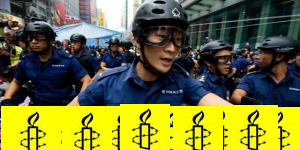South Korea: Stop tear gas supply or risk fuelling repression in Turkey
The South Korean authorities must immediately stop the planned shipment of massive amounts of tear gas to Turkey, where the security forces have frequently abused riot control equipment amid repression of peaceful protests, Amnesty International said.
A credible source has tipped off the organization about a planned export to Turkey of nearly 1.9 million tear gas cartridges and gas grenades. The first batch of riot control equipment is scheduled for delivery by a South Korean company to the Turkish government in mid-January 2015.
“All shipments of tear gas and other riot control equipment to Turkey must be suspended immediately or they risk fuelling further repression and abuses,” said Marek Marczynski, Head of Military, Security and Police at Amnesty International.
“The South Korean authorities need to send a clear and urgent message that no arms will be supplied to a country where abusive and arbitrary force is being used against protesters. The Turkish government’s failure to guarantee the right to peaceful protest is completely contrary to international standards on policing and human rights.
“Turkey has a woeful record of misusing tear gas during demonstrations, frequently firing gas canisters directly at protesters. No responsible government should be fuelling abuses on this scale.”
According to Amnesty International’s source, the planned transfer from South Korea to the Turkish government includes 1,898,515 “less lethal” chemical irritants. These include four sizes of tear gas cartridges, totalling 1,509,015 items, and 389,500 gas grenades. The first shipment of some 550,000 items is scheduled for mid-January 2015, with the rest to follow by mid-May.
The type and quantities of equipment are consistent with what the Turkish security forces used against demonstrations in the past year and what they would need to replenish their stockpiles in 2015. The South Korean arms manufacturer has previously supplied riot control equipment to the authorities in Turkey as well as Bahrain.
Repression of demonstrations
Between 28 May and mid July 2013, demonstrations known as the Gezi Park protests took place in all but two of Turkey’s 81 provinces, ranging between crowds of a few hundred to tens of thousands. Security forces across Turkey repeatedly used abusive and arbitrary force against peaceful protesters, sometimes with fatal consequences. At least four protesters died as a direct result of police use of excessive force, including 15-year-old Berkin Elvan and 22-year-old Abdullah Cömert, who were hit in the head by tear gas canisters fired at close range. More than 8,000 people were injured, some very seriously, during the wave of protests.
In 2014, police used excessive force against peaceful May Day demonstrators near Istanbul’s central Taksim Square.
On multiple occasions, Amnesty International has documented how Turkish police and security forces used tear gas and water cannon in excessive, unwarranted and arbitrary ways to disperse protesters, and fired at unarmed protesters using rubber bullets and plastic bullets, killing and seriously wounding some. Thousands more have been beaten by police and security forces. Protesters, human rights activists and journalists have been arrested and detained.
“Right now, no government should be supplying the Turkish authorities with the tools to crush further peaceful demonstrations. All transfers of tear gas and other riot control equipment must be suspended until the Turkish authorities can ensure such repression will not be repeated, and commit to carrying out thorough, impartial and independent investigations into past abuses by the security forces,” said Marek Marczynski.
Background
As a participant of the Wassenaar Arrangement – an association of 41 of the world’s largest arms exporters – South Korea has committed to upholding the group’s guidelines and principles. This includes a requirement that states avoid authorizing the export of arms, including chemical irritants and launchers, to contexts where they are likely to be used to commit human rights violations. Under the Wassenaar Arrangement, the conventional arms control lists agreed should include the strict regulation of the export of items used for force in riot control.
The abusive and unlawful use of force by Turkish security forces against protesters also underscores the urgency of the rapid and effective implementation of the Arms Trade Treaty (ATT), which enters into force on 24 December 2014. South Korea has signed but not yet ratified the treaty, which calls on states to carry out a rigorous a risk assessment prior to licensing the exports of conventional arms. When there is a substantial risk the arms would be used to violate international human rights or humanitarian law, the license shall not be granted.




